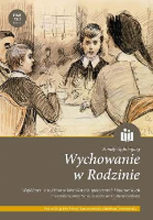Współpraca z rodzinami wychowanków jako element
funkcjonalności instytucji resocjalizacyjnej dla nieletnich
Cooperation with the charges’ families
as a component of functionality of re-socialization
institutions for minors
Author(s): Barbara JEZIERSKASubject(s): History, Social Sciences, Education, Sociology, Social history
Published by: Zakład Historii Edukacji w Instytucie Pedagogiki Uniwersytetu Wrocławskiego
Keywords: juvenile delinquents; parents of juvenile delinquents; re-socialization institution; functionality
Summary/Abstract: Efficient functioning of a re-socialization institution is a condition of its growth and key factor of appropriate course of the community life that within its structure. Its efficiency relies on explicitly, clearly acknowledged objectives, its internal organization and division of work load as well as the independence of the professional tasks from the personal interests of the staff. Moreover, it tackles the conformity of the staff aspirations with aims and assignments for the accomplishment of which such a structure has been established, entailing high internal integrity, productive cooperation with other facilities and the external environment. It enables the achievement of the projected and socially desired outcomes as well as the accomplishment of common goals upon arrangements of various activities. Cooperation with the family environment of the charges constitutes a key element of the functionality of every re-socialization institution. It must be remembered that parents of the juvenile delinquents manifest features disabling the appropriate course of the upbringing, which consequently can lead to the children’s criminogenic lifestyle. Such features concern structural properties of the families, qualities related to the emotional attitude to their child, parental competences and last but not least – upbringing methods. Non-structural features can be subject to modification in given circumstances. Nonetheless, it is a challenging task particularly when institutions do not participate in the process of family support. Inclusion of the charges’ parents in the process of its correctional activities can condition the quality of educational measures accomplished within, becoming a key indicator of a rational organization and correction of behavior, reforming socially maladjusted behaviors of children and teenagers.
Journal: Wychowanie w Rodzinie
- Issue Year: XIII/2016
- Issue No: 1
- Page Range: 497-510
- Page Count: 14
- Language: English, Polish

